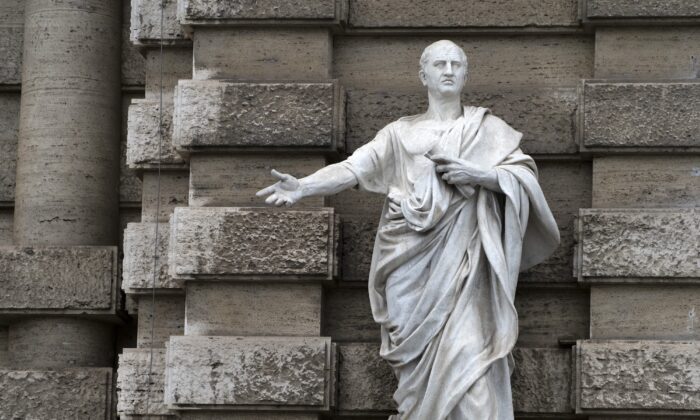In this post, we will delve into the First Founding Principle, which uncovers the often neglected yet crucial cornerstone of the entire U.S. Constitution.
I would like to offer a quick disclaimer. This is my personal interpretation of the principle, influenced by my extensive readings of Cleon Skousen’s book “The Five Thousand Year Leap,” years of discussions with his son, Professor Paul Skousen, and my own insights.
For those interested in delving deeper into the original principles, I suggest reading the book. These series of posts aim to provide fundamental and concise concepts before delving further into the book.
What Should a Government Base Its Governance Upon?
The Founding Fathers believed that government should be grounded in Natural Law. However, many people today do not fully grasp what that entails.
The most explicit explanation of Natural Law was provided by Marcus Tullius Cicero, a Roman statesman and jurist from ancient Rome.
The Founding Fathers did not develop these ideas in isolation. They drew wisdom from ancient Israel, Great Britain, Greece, and Rome. Influential figures included Polybius, an ancient Greek historian; Marcus Tullius Cicero, the Roman statesman; English philosopher John Locke; Scottish economist Adam Smith; and French political thinker Montesquieu.
Among these thinkers, Cicero shines brightly.
Cicero and Natural Law
Cicero (106–43 BCE) was a Roman statesman, orator, lawyer, and philosopher. As a consul of the Roman Republic, he staunchly defended the republic and opposed the emergence of the empire. Tragically, he was assassinated by soldiers dispatched by Mark Antony, one of the last “Triumvirs.” Cicero left behind enduring works like “De Re Publica” (“On the Republic”) and “De Legibus” (“On the Laws”), envisioning future societies based on Natural Law.
Cicero believed that a society founded on Natural Law aligns with the will of the Creator. He maintained that the vast universe was created by God and that God’s wisdom and will embody the law of the universe—or Natural Law.
Natural Law is universal, spontaneous, transcends national or regional boundaries, is undeniable, and cannot be refuted by man.
The will of the Creator is often reflected through religious texts like the Bible and the scriptures of Buddhism and Taoism. Furthermore, Natural Law can be discerned through human reason and common sense. For instance, principles such as “one must pay with their life if they commit murder” and “parents must be respected and cared for by their children” are universally acknowledged.
Regardless of how Natural Law is articulated or perceived, its constants are goodness, universality, fidelity to objective truth, comprehensibility, and moral conduct on earth.
Cicero also posited that humans differ from animals because the Creator fashioned man in His image, granting humans reason and deduction. This rationality empowers humans to solve challenges and govern wisely. When wisdom is applied in governance, it leads to “just government.” According to Cicero, a society structured through mutual agreement based on Natural Law constitutes “the State.”
Cicero existed approximately a century before Jesus Christ, yet they both underscored two fundamental natural rules: to worship the Lord and to love your neighbor as yourself.
In Cicero’s perspective, not every human-made law is just. Only those aligned with Natural Law—or God’s law—are deemed good laws.
The Influence of Cicero on the Founding Fathers
Inspired by Cicero, the Founding Fathers of the United States believed that America must be a moral and virtuous society rooted in Natural Law to evade the moral decay and corruption that plagued numerous past nations.
Manifestations of Natural Law
So, how does Natural Law manifest itself? Here are some instances:
Inalienable rights, with life being paramount. This encompasses the right to property and the right to generate wealth.
An individual cannot be arbitrarily detained or convicted of a crime. They possess the right to a fair trial.
The right to be safeguarded from harm.
The right to engage in contracts.
The right to safeguard family and marriage.
Parental duties and the right to educate offspring.
The right to equitable recompense.
The right to possess weapons for self-protection.
The right not to be taxed without representation.
A restrained government is crucial to prevent despotism.
The system of checks and balances, with the separation of powers, is imperative to prevent power abuse.
In fact, the U.S. constitutional structure is underpinned by these Natural Law principles.
Thomas Jefferson articulated in the Declaration of Independence: “We hold these truths to be self-evident, that all men are created equal, that they are endowed by their Creator with certain unalienable Rights, that among these are Life, Liberty, and the pursuit of Happiness.”
These proclamations stem from the tenets of Natural Law. Without comprehending this fundamental point, we cannot delve into any other founding principles.
Next, we will delve into the second principle: “A free people cannot endure under a republican constitution unless they remain virtuous and morally robust.”
The opinions expressed in this post are solely those of the author and do not necessarily reflect the views of The Epoch Times. Please rewrite this sentence.
Source link






